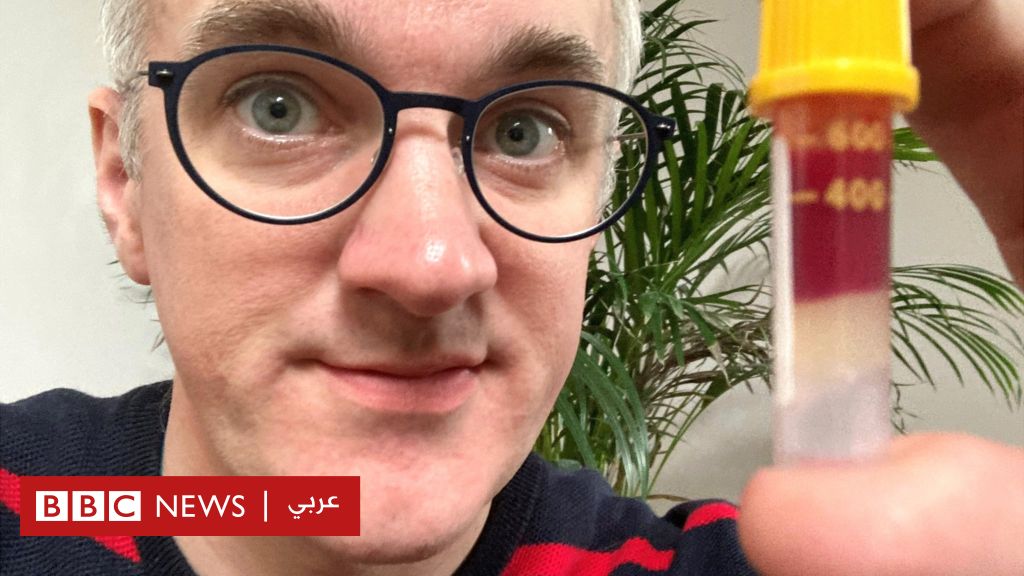- James Gallagher
- Health and Science Editor – BBC
I hope this blood sample contains answers, because I have a burning question: have I never had the coronavirus?
That someone could avoid getting infected seemed great. The virus has spread around the world since it appeared in China nearly three years ago. And the new variants just kept getting better at infecting us. Even vaccines only reduce the severity of the virus and do not give us an impenetrable shield.
But I kept working all that time, even during the lockdowns, and the virus hit the rest of my family hard, yet I didn’t get sick. I am by no means the only person who has not developed symptoms of Covid and not tested positive. An estimate published last summer suggested that one in 10 people in the UK had not yet been infected.
So what’s going on? Does my body and the bodies of people who have never had COVID hold any secrets to fighting the disease?
There are three general possibilities if you think you’ve never had the virus:
- To be wrong, you actually had the virus but didn’t realize it
- You shouldn’t have touched it
- Or your body has an additional defense mechanism that has successfully countered it
“There are a lot of people who say they have never had Covid,” says Dr Lindsey Broadbent, a virologist at the University of Surrey in England, “most of them are probably wrong, they may have been infected but it didn’t result in any symptoms.”
“But we know there are some people who have never been infected, even among those who work in a high-risk environment, such as nurses.”
A study of people who took regular Covid tests found that half of people infected with the Omicron variant either didn’t realize they were infected or attributed mild symptoms to another cause.
The blood sample — which it pained me to pull from my index finger — will determine whether or not I’m fooling myself too. I put the sample in a small vial and ship it to a research lab for analysis of the antibody mixture it contains.
Antibodies are part of the immune system and act like projectiles that attach to viruses, preventing them from infecting cells in the body and telling the rest of the immune system to kill the virus.
Different types of antibodies attach to different parts of the virus, and the test focuses on two of them:
- Antibodies that attach to a protein on the surface of the virus called a spike protein.
- Antibodies that attach to the inner layer of the virus, called the nucleocapsid, and protect the genetic code of the virus.
All vaccines used in the UK train the body to attack only the spike protein. Even a year after my last booster dose, testing showed I had elevated levels of spinal protein antibodies.
The body only learns to attack other parts of the virus when it encounters the virus itself. If I have nucleolar capsid antibodies in my blood, it means that I have already had a covid infection.
The test result is negative, so the idea that I never had Covid has passed its first hurdle.
Professor Mala Maini, a lecturer in viral immunology, invites me to her lab at University College London to review the results.
“It could mean you weren’t infected at all, but it could also mean your body made antibodies against the nuclear capsid and then they disappeared from your blood,” she tells me.
Professor Mala Maini explains the results of a blood test to James Gallagher
However, none of the COVID tests I have taken have come back positive, even though I:
- I’ve been taking rapid swab tests twice a week for most of the pandemic so I can go to work
- I took PCR tests, or rapid tests, whenever I had symptoms
- I was getting tested daily when my family members got sick with covid
Professor Maini’s conclusion was as follows: ‘The addition of this to your nuclear capsid antibody test result indicates that you may not have had a full-blown infection.’
“You may have had what we call an abortive infection.”
preventive immunity
The idea of an aborted infection means that you are targeted by the virus, and the virus even gets to the places it needs to start the infection, but your body traps it before it can spread.
We know this happens from studies that have infected people. During these experiments, the virus was squirted into the noses of healthy volunteers, yet of the 34 people who participated in the study, only half became infected.
The first line of protection is the innate immune system. This is our body’s automatic defense. This device cannot “remember” different virus infections, so every time an infection occurs it’s like the first time. But it works quickly and can halt or stop the infection from spreading.
Dr Broadbent explained this by conducting experiments in which she used mini-lungs grown from human cells and tried to infect them with the virus.
“We found a person we couldn’t infect,” Broadbent says.
The other half of the immune system is known as the adaptive or adaptive immune system, which learns and improves with practice. And here the role of vaccines that prepare the body to fight Covid comes into play.
“Maybe the vaccines have done their job perfectly and give you very good immunity,” says Professor Maini.
But vaccines provide only limited protection against infection with the virus, and it is rapidly running out. There were also no vaccinations during the first year of the epidemic.
However, there are other ways this part of the immune system can stop the infection.
Blood samples taken from hospital workers before the pandemic showed that some of them already had so-called T lymphocytes. These cells act as sentinels, checking other cells for signs of infection. And if they find an infected cell, they kill it.
Even before the first cases arrived in the UK, some people had these Covid-fighting cells in their blood. This is most likely caused by the common cold coronavirus, which is very similar to the COVID-19 virus.
“If you have young children who go to school, it is very likely that you have been exposed to these viruses in previous years,” Professor Maini tells me.
“If you have these T cells on high alert all the time, they can act much faster and kill the infection before it shows up in the test result.”
The hope is to develop a new generation of vaccines that can mimic this pre-existing immunity.
“If we can get the T cells to stick inside the virus and then elicit that response in the nose, airways and lungs, there’s a much better chance they’ll be able to abort the infection before it spreads.” says Prof. Maini “This is the goal”.
My intuition tells me that the wave of microbes every child carries from daycare to already weary parents may have helped me avoid Covid.
Are there any other explanations?
There are two other possibilities, but one doesn’t apply to me and the other is very rare.
Some people are never exposed to the virus because they have stopped socializing. And I’ve interviewed people who self-isolate for nearly 1,000 days, usually because their immune systems are weak, making them more fragile. This doesn’t apply to me, as I used to take the train to work during the epidemic and also slept next to my baby during his illness.
The second idea is genetic immunity which occurs with other diseases.
A well-known example is the human immunodeficiency virus (HIV). There are a small and rare number of people born with a genetic mutation that completely protects them from the virus. Called CCR5 for short, this mutation occurs in a part of their genetic code and changes the “locks” in their body’s cells so that HIV can’t get inside. This has been exploited in the treatment of some patients infected with the virus and it was found that similar mutations were able to prevent the Corona virus from entering the cells of some people’s bodies.
“The number of people who have this type of genetic resistance is very small,” says Dr. Broadbent.
Will I be safe from covid this winter then?
So can I and other people who haven’t contracted the virus feel hopeful as the Christmas season approaches, or are we really at greater risk?
The protection conferred by the vaccine means that the chances of infection causing severe disease symptoms decrease slightly, even if the vaccine cannot stop the infection completely.
But some research, including a study conducted in Switzerland, indicates that being infected with the virus and receiving the vaccine — or what’s called hybrid immunity — results in the strongest immune response.
So Professor Maine warns me that I might be “a little more touchy”.
Dr. Broadbent agrees, saying, “If you think you haven’t had it yet, that doesn’t mean you’re resistant to it… Most likely, you’re in luck.”
Personally, I suspect that writing this article will tempt fate, ensuring I catch Covid by Christmas!


